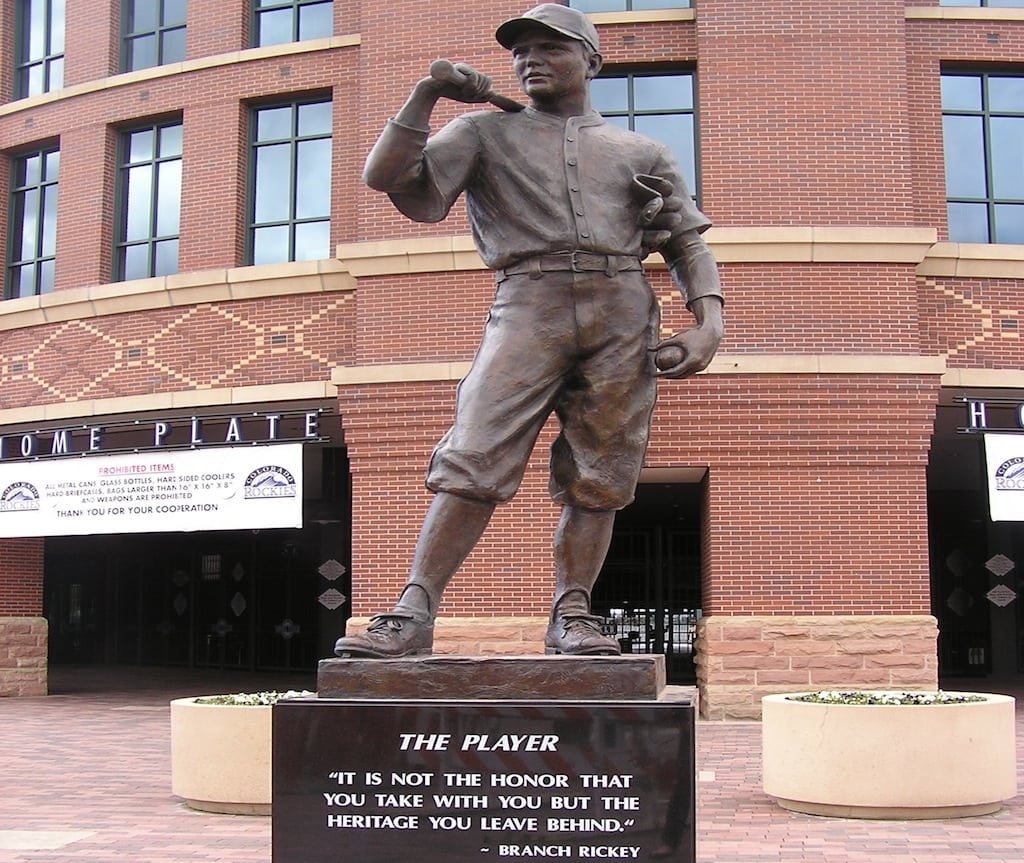Ohio hometown of baseball exec Branch Rickey awaits "42" tourism boom

Skift Take
The southern Ohio home county of late baseball executive Branch Rickey expects increased interest from his depiction in the movie "42" as the baseball executive who signed Jackie Robinson to break the color line.
The movie, which opened nationally this weekend, tells the story of how Robinson became the first black player in modern Major League Baseball. Actor Harrison Ford portrays Rickey, who decided Robinson was the right player to endure playing amid the harsh prejudice a black man would face.
Rickey was born in southern Ohio in 1881 and is buried there, in Rushtown Cemetery in the community of Rushtown. He is also among those featured on Portsmouth's Floodwall Murals, colorful artwork stretching along a 20-foot-tall floodwall showing the history and famous figures of the Ohio River city some 100 miles east of Cincinnati.
"It should heighten interest, make people more aware that he was from this area," said Kim Bauer, executive director of the Portsmouth-Scioto County Visitors Bureau. "And even some people locally will have an 'aha' moment. They didn't realize he was from here. It is something that should heighten interest for people coming to see the murals."
Among others featured on the murals are star athlete Jim Thorpe, who played for and coached a Portsmouth football team, and singing cowboy movie star Roy Rogers, who was raised near Portsmouth, a city of some 21,000 people. Besides signing Robinson, Rickey is known as a highly successful baseball innovator who also pioneered the farm system approach to developing players in minor league.
Rickey's home is not open to the public but the cemetery where he is buried is. His gravesite is near Portsmouth, and the Shawnee State University baseball team in the city plays at Branch Rickey Park. The school hosted an advance screening of the movie Thursday evening. Among those attending was Al Oliver, a Portsmouth native who starred for major-league teams including the 1971 world champion Pittsburgh Pirates.
Oliver said Rickey's role in opposing segregation is particularly notable for someone who came from the predominantly white Appalachian region that struggled with racism.
"No. 1, most people would not believe that someone from southern Ohio would have been the one to have made that move," Oliver said Friday.
He credits Rickey's upbringing and Christian faith for giving him the determination to integrate baseball.
"His spiritual outlook on life was what made him the man he was," Oliver said of Rickey, while also paying tribute for Robinson for his strength and perseverance to pave the way for the black players who followed. Oliver played baseball in southern Ohio as a boy with Larry Hisle, who also starred in the major leagues. Both are black.
Oliver, a motivational speaker who returned to Portsmouth to live after baseball, is active in supporting a community that fell on hard economic times after the decline decades ago of steelmaking and other industrial employers in the region. He said its strong sports history can be used as a drawing card.
Oliver and fellow local native Gene Bennett, a longtime scout for the Cincinnati Reds, recently testified before an Ohio Legislature committee for a bill by state Rep. Terry Johnson, R-McDermott, which would rename part of U.S. 23 the Branch Rickey Memorial Highway, the Portsmouth Daily Times reported.
Oliver, who gave "42" high marks, said renewed attention to Rickey's historic role for civil rights should be uplifting for the region.
"I think it gives a better perspective on southern Ohio — the people who are from here and the people who live here today," Oliver said. "Anyone who watches that movie from southern Ohio should take pride, whether you're black or white. Maybe it will bring all of us just a little bit closer together."
Copyright (2013) Associated Press. All rights reserved. This material may not be published, broadcast, rewritten, or redistributed. ![]()




